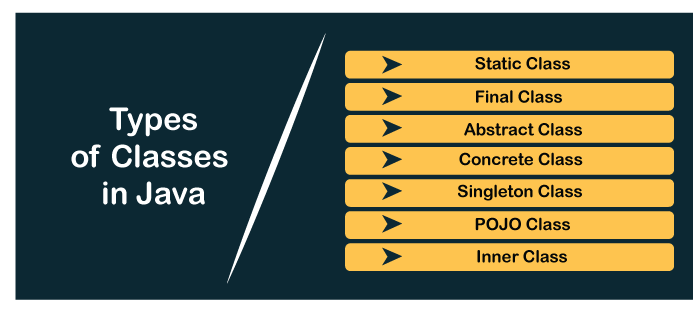Types Of Classes :
Abstract class
- If class contains abstract methods then it must be declared as abstract.
- Abstract class may or may not contain abstract methods.
Without abstract methods why class is declared as abstract?
- If class don't want to be instantiated
Classes which contain common method implementations to all its sub classes are declared as abstract such as Component class is Java AWT/Swings, HttpServlet in servlet API.
Component sub classes are:
Label, Button, TextField, TextArea, List, Checkbox, CheckboxGroup, H/V Scrollbar, Drop down list
Properties that are commonly required in all component sub classes are:
- x, y, width, height, background, foreground, text, visible, enable, editable, resizeable. These properties needs one pair of setter and getter methods.
- All together 22 methods are required. These 22 methods implemented in 10 component subclasses together comes to 220 methods.
- Instead of implementing all 22 methods in all the sub classes. These methods are defined only in one single Component class.
- Component class itself don't want to be instantiated. Hence it is declared as abstract.
Though generic method implementations coming from abstract super class, if child classes want to override they can override super class methods.
E:\active\core\am3\javalang\oops\abstraction inheritance polymorphism\abstract class
// AbstractClass.java
public abstract AbstractClass {
// private abstract void print(String name);
// illegal combination of modifiers: abstract and private
protected abstract void print(String name);
}
// AbstractClassSubClass.java
public class AbstractClassSubClass extends AbstractClass {
public void print(String name) {
System.out.println("print() method from AbstractClassSubClass name is "+name);
}
// weaker access privilege error comes because super class method is protected, it can go upto sub class outside the package
/* void print(String name) {
System.out.println("print() method from AbstractClassSubClass name is "+name);
}*/
}
// AbstractClassClient.java
public class AbstractClassClient {
public static void main(String rags[]) {
AbstractClass ac=AbstractClassSubClass();
ac.print("Nani");
}
}
class
- To class we can apply default or public access specifier.
- To access modifier is by default applied to class.
- All methods are implemented in class.
- Class can be both inherited and as well as instantiated.
If class is written with default access specifier during compilation compiler will generate one default constructor in the class.
- default constructor always generated with no parameters and its access specifier is as same as class access specifier that means if class declared with default access specifier constructor is also generated with default access specifier.
- If class is declared as public then its constructor is also generated with public access specifier.
// DefaultClass.java
class DefaultClass {
int i, j;
}
// public Class.java
public class PublicClass {
int i, j;
}
// AnotherDefaultClass.java
class AnotherDefaultClass {
int i, j;
// no default constructor is generated by compiler
// constructor with 2 parameters
AnotherDefaultClass(int a, int b) {
this.i=a;
this.j=b;
}
// if we explicitly generate a constructor no parameter constructor, then default constructor generation is possible in sub class.
AnotherDefaultClass() {}
}
// AnotherDefaultClassSubClass.java
class AnotherDefaultClassSubClass extends AnotherDefaultClass {
int k,l;
// before this if no parameter constructor doesn't exist in the super class
/* when we dont write any constructor, one default constructor is generated that will implcitly call super(), then during compilation compiler say cannot find symbol AnotherDefaultClass() */
// no parameter constructor
AnotherDefaultClassSubClass() {
super();
}
// two parameter constructor
AnotherDefaultClassSubClass(int a, int b) {
super(a,b);
}
// four parameter constructor
AnotherDefaultClassSubClass(int a, int b, int c, int d) {
super(a,b);
k=c;
l=d;
}
}




0 Comments